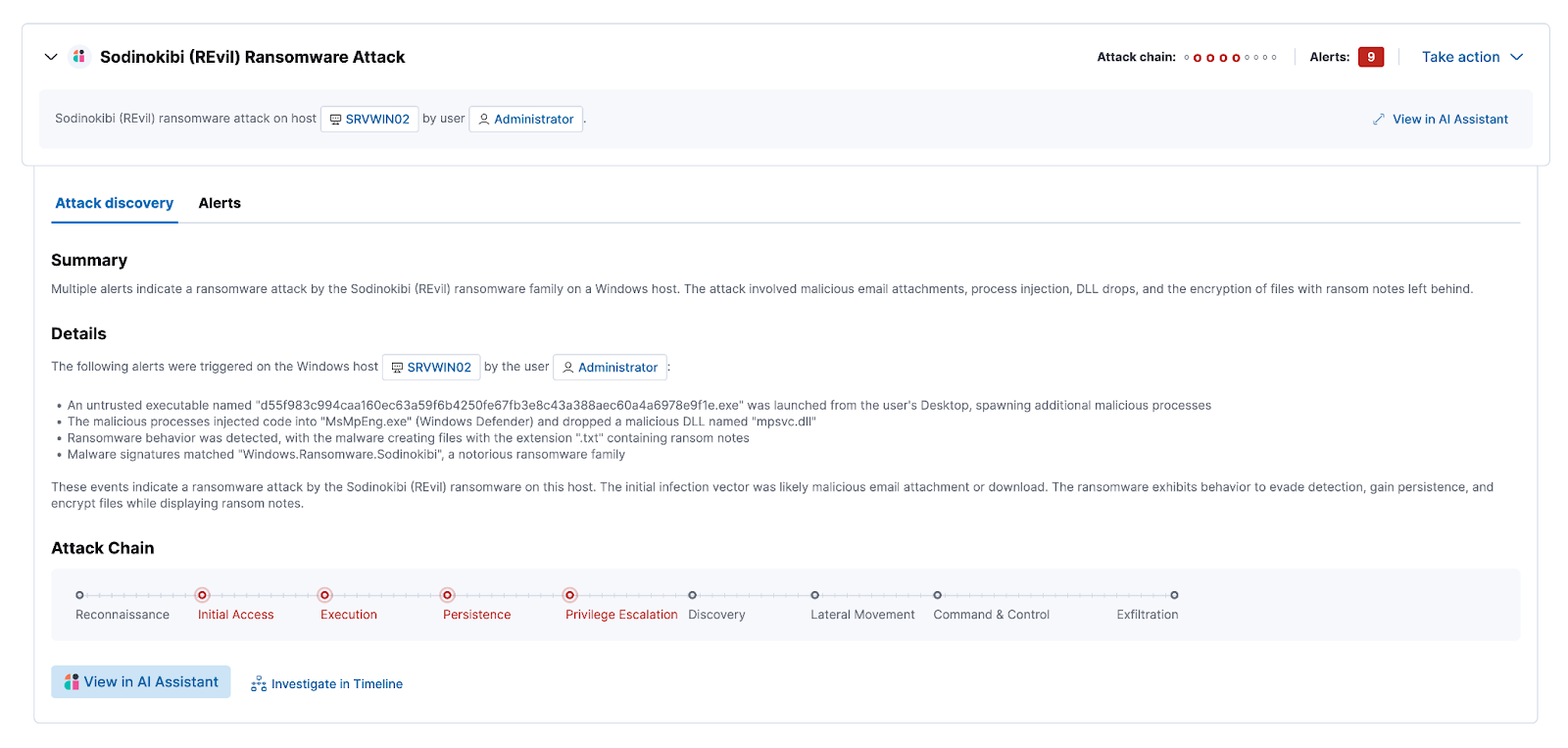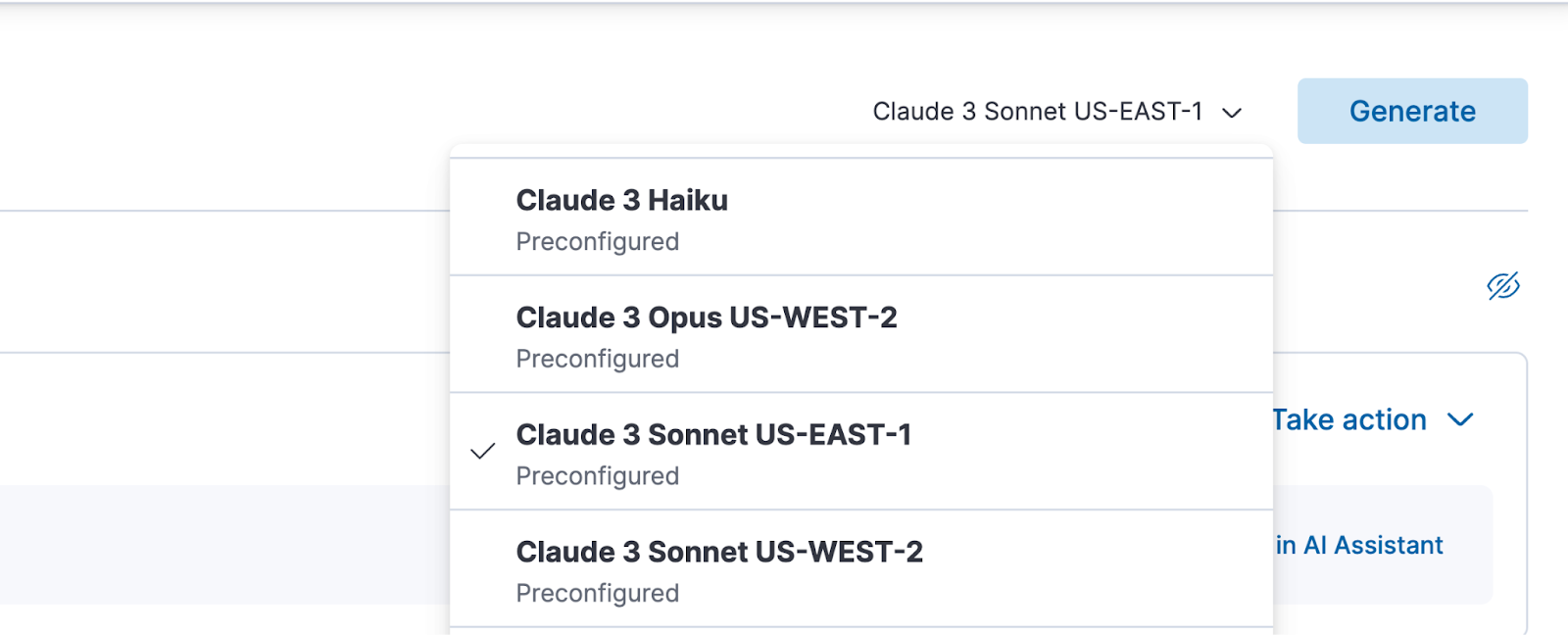Elastic integrates Anthropic's Claude 3 models to enhance AI-driven security analytics

For security analysts navigating an increasingly complex threat landscape, the ability to quickly identify and respond to attacks is critical. Security information and event management (SIEM) tools have been integral to helping security teams quickly respond to attacks. Now, in the era of generative AI, Elastic is changing the game by delivering AI-driven security analytics to replace SIEM and modernize the SOC.
Elastic’s approach to AI for the SOC includes several generative AI features embedded within the Elastic Security solution that fundamentally enhance security analysts' ability to defend their environments. The freedom for security teams to choose their large language model (LLM) of choice to serve as the engine for these critical generative AI tools is important as they balance partner, technology, and data governance requirements.
Fortunately, Elastic's open framework facilitates seamless integration with various LLM providers, enabling adaptation to the rapidly evolving AI landscape. To support our customers with LLM provider choices, Elastic now integrates with Anthropic’s Claude 3 family of models, which offers a powerful combination of performance, accuracy, and scalability for security use cases. This integration allows Elastic's customers to leverage the power of Claude's deep reasoning capabilities and speed to enhance threat detection, automate security tasks, and strengthen their overall security posture.
Using Claude 3 models with Elastic's Attack Discovery and AI Assistant
The combination of Claude 3 models with Elastic's Attack Discovery and AI Assistant features offers a powerful solution for security teams. Attack Discovery automates key triage steps, synthesizing numerous alerts into actionable discoveries by leveraging Claude's ability to identify patterns and correlate events in near real time. This enables the spotlighting and prioritization of the most pressing threats, such as identifying a potential coordinated attack chain based on unusual login patterns following a phishing alert.

Furthermore, the Elastic AI Assistant allows analysts to delve deeper into each alert by asking Claude follow-up questions. Claude then provides security teams with trusted and specific remediation steps based on Claude's understanding of business context and data. This streamlined process enhances both initial threat detection and subsequent analytical tasks, enabling swift and informed responses to security incidents.
Strengthening enterprise security with the Claude 3 model family
The Claude 3 lineup includes three distinct models, each offering unique strengths tailored to different use cases for Elastic’s customers:

Haiku: Designed for cost-effectiveness, Haiku is ideal for organizations with budget constraints or when dealing with lower-risk scenarios. It excels at quickly answering simple questions when used with the Elastic AI Assistant for Security.
Opus: Prioritizing accuracy above all else, Opus is best suited for high-stakes situations where precision is paramount.
- Sonnet: Striking a balance between Haiku and Opus, Sonnet provides the best middle ground for most security operations. It is both affordable and precise, making it the ideal choice for use with Attack Discovery.
Elastic's AI Assistant allows for seamless switching between these models within unified workflows, ensuring that security teams can always use the best features of each model to optimize their work, automate routine tasks, and uncover critical insights about threats.

"Security is paramount, but increasingly complex amid a growing number of threats and attacks. By combining Claude's deep reasoning capabilities and speed with Elastic's Attack Discovery and AI Assistant features, customers can quickly detect threats, automate security tasks, uncover critical insights, and take action," said Michael Gerstenhaber, VP of Product at Anthropic. "The Claude 3 model family enables Elastic's customers to easily select the most suitable AI model for their specific needs to strengthen their security posture."
Customer benefits of the integration
The integration of Anthropic's Claude 3 models with Elastic's AI-driven security analytics solution offers several key benefits:
Enhanced threat detection: Claude's deep reasoning capabilities and expansive 200,000 token context window enable the identification of intricate, multi-event attack patterns that may span numerous alerts or data sources.
Automated security tasks: Attack Discovery reduces time spent on manual threat detection and response efforts by automating the correlation and documentation of attack sequences, allowing analysts to focus on more strategic priorities.
Flexibility in model selection: Elastic's agnostic approach to supporting LLMs ensures that customers can always choose the best model for their unique security needs, balancing performance, accuracy, and cost-effectiveness.
Streamlined workflows: The Elastic AI Assistant provides ready access to all three Claude 3 models within unified workflows, enabling analysts to easily switch between models depending on their needs and the severity of the threat.
As the threat landscape continues to evolve, the integration of Anthropic's Claude 3 models with Elastic's AI-driven security analytics solution empowers security teams to stay ahead of the curve, quickly detect and respond to threats, and maintain a robust security posture.
Leverage generative AI to stay ahead of emerging cyber threats
Through the powerful combination of Attack Discovery and Anthropic's flexible Claude 3 models, Elastic Security aims to empower organizations to stay ahead of emerging cyber threats. These models are all available to use via our Amazon Bedrock integration. Use them with Attack Discovery and AI Assistant for Security to gain enhanced threat visibility, accelerate response processes, and fortify your security posture. Try out Attack Discovery and AI Assistant in a free trial.
The release and timing of any features or functionality described in this post remain at Elastic's sole discretion. Any features or functionality not currently available may not be delivered on time or at all.
In this blog post, we may have used or referred to third party generative AI tools, which are owned and operated by their respective owners. Elastic does not have any control over the third party tools and we have no responsibility or liability for their content, operation or use, nor for any loss or damage that may arise from your use of such tools. Please exercise caution when using AI tools with personal, sensitive or confidential information. Any data you submit may be used for AI training or other purposes. There is no guarantee that information you provide will be kept secure or confidential. You should familiarize yourself with the privacy practices and terms of use of any generative AI tools prior to use.
Elastic, Elasticsearch, ESRE, Elasticsearch Relevance Engine and associated marks are trademarks, logos or registered trademarks of Elasticsearch N.V. in the United States and other countries. All other company and product names are trademarks, logos or registered trademarks of their respective owners.